With over 3.3 million learners, nearly 232 programmes, 67 regional centres and 3000+ support centres, Indira Gandhi National Open University (IGNOU) stands out easily above all distance education universities, not just in India but even abroad. In just over three decades, it has silently revolutionised India’s higher education landscape and boosted the career prospects of millions of its marginalised and disadvantaged learners by bringing higher education to their doorsteps. What’s the true story of this most popular and forward-thinking university of India? How does it keep serving the masses as well as working professionals through its affordable distance education and online courses? That too in a variety of subjects including Arts, Science, Commerce, Law, Informatics, Nursing, Management, Engineering and more. Corporate Citizen caught up with Prof (Dr) S.B. Arora, Vice Chancellor, to learn what it takes to run this leviathan people’s university...
‘You may earn anything in life including big money, name, fame and whatever else you can think of but there is no substitute to education. It’s your passport to the future because tomorrow belongs only to those who prepare for it today’
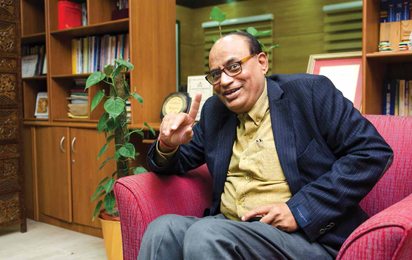 Prof (Dr) S.B. Arora
Prof (Dr) S.B. AroraA doctor by profession, Prof S.B. Arora’s association with IGNOU, of which he took charge as Vice Chancellor (VC) only four months ago, dates back to his student days when he was himself a student of its diploma course in distance education. With over 23 years of experience in IGNOU, of which 17 years as Professor, he also served as Director of its School of Health Sciences (2005-08). But that’s not all. For the last several years, he has been playing an important role in implementing several other key IGNOU programmes including those in Maternal & Child Health, Hospital & Health Management, Nursing & Paramedical Sciences and Medical Record Keeping, to name just a few. Prior to joining IGNOU in 1994, Prof Arora also worked at the National Institute of Health & Family Welfare in Delhi. A thoroughly down-toearth, modest and soft spoken person, he talked freely about the little-known stories of this largest distance education university which has earned the exceptional reputation for enhancing the learning experience of its millions of students. Edited excerpts:
We have to go back to 1970 when the UGC, UNESCO and the Ministry of Education jointly organised a seminar in Delhi on the idea and concept of ‘Open University’. Most scholars felt India needed it because higher education was not reaching out to the masses and it provided the perfect solution especially for women who give up education mid-way due to financial barriers, time constraints and family reasons. So, the Government of India (GOI) appointed an eight-member working group in 1974 under the guidance of G. Parthasarathi, an eminent journalist, educationist and diplomat. He was someone who had been adviser to all our PMs from Nehru to Rajiv Gandhi and was the first VC of the Jawaharlal Nehru University (JNU) who also founded the Indian Institute of Mass Communication (IIMC).
His group recommended establishing an open university by an act of Parliament as early as possible. It also said this university should have jurisdiction over the entire country so that students, even in the remotest corners of India, can have access to its material and degrees. It also gave valuable suggestions as to how to prepare study material, how to set up core groups in different subjects, how to set up study centres to maintain live contact with students and give age relaxations. Finally, in 1985, the then PM Rajiv Gandhi took the initiative and introduced a Bill in Parliament in August, which was passed by both the Houses and thus IGNOU came into existence on September 20, 1985, named after the late PM Indira Gandhi. That, in a nutshell, is the story behind its creation.
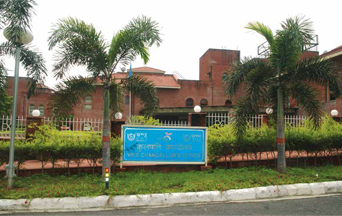 Vice Chancellor’s office at the huge IGNOU campus
Vice Chancellor’s office at the huge IGNOU campusThe concept was known, but in the form of correspondence education system only. Universities like Annamalai and even Delhi University were offering correspondence courses but it meant sending some reading material to students to help them face their final examinations and that’s all. It was not a dynamic and technology-driven system such as we have developed, here at IGNOU.
Since our objective was to provide higher education to the largest segment of our disadvantaged population, we tried to take the advantage of technology right from the beginning. Our strategy was not limited to sending books and notes only. We also started using radio and multi-media in very effective ways. We prepared interactive audio and video programmes for broadcasting and sent cassettes and CDs to students to explain important concepts of various courses from our Electronic Media Production Centre (EMPC). We also started organising weekly classes at convenient places for our students. The objective was to make distance education as supportive, easy, attractive and interactive as possible, more so for courses in technical, engineering, management and health sciences because they involved complex concepts.
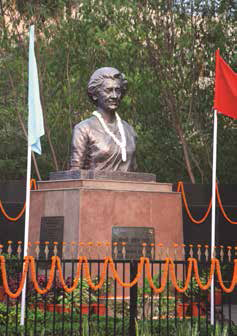 Indira Gandhi National Open University (IGNOU)
Indira Gandhi National Open University (IGNOU)It has been a great help as it has made our students, sitting at the other end, not only listen to their teachers but also ask questions in between. In fact, in 1999, we launched the first virtual campus in India, beginning with the delivery of Computer and Information Sciences course via the Internet. These virtual classrooms that we set up proved to be a big hit. Today, thanks again to the Internet, we’re at the threshold of a digital revolution that heralds Integrated Information Communication Technology or ICT application in higher education for open and digital learning.
No, because these things came with the progress of technology. But meanwhile, we kept strengthening the development of our interactive multimedia content and learner support through video conferencing and web-based platforms. Our courses are also gaining immense popularity, thanks also to the ICT offering us a robust IT platform for MOOCs or Massive Open Online Courses.
Way back in 1985, when we began, internet was not there. We had only two programmes— Diploma in Management and Diploma in Distance Education, and our strength was 4,528. Today it has gone well over three million learners. In the beginning, we had only nine Schools, mainly in Social Sciences. Today, we offer a whopping 232 programmes or courses—ranging from certificate level to PhD—through our 21 Schools of Studies, and the cumulative number of our students, both domestic and international, has also gone well beyond 3.3 million! We provide our services through a network of as many as 67 Regional Centres and over 3000 Learner Support Centres (LSCs) throughout the country. We’ve also setup Special LSCs for marginalised, disadvantaged, differently-abled learners, especially women, so as to make education available right at their doorsteps. Today all our 21 Schools are located here in this huge campus, but at that time, we started with some small, rented buildings in Hauz Khas and other areas of Delhi. One School was here, the other was somewhere else and it was not easy to prepare books, cassettes, CDs as well as hold counselling sessions. Computers had not come and we were still in the era of typewriters. But we kept integrating technology into our delivery mechanisms so that the access of our resource material was in the easy reach of the most disadvantaged of our society. So in a short span of just three decades, we’ve grown to become the People’s University of the world—not just in terms of numbers but also in terms of quality!
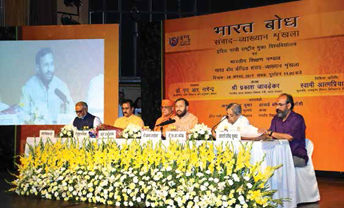 Union HRD Minister Prakash Javadekar addresses the IGNOU students during the Bharat Bodh event held in New Delhi recently
Union HRD Minister Prakash Javadekar addresses the IGNOU students during the Bharat Bodh event held in New Delhi recentlyCompared to the fee charged by regular colleges and other similar open universities, the fees for our courses are peanuts. It’s heavily subsidised because our primary aim is not to make money but to serve as many poor as possible. For instance, you can do a BA/B.Sc course from IGNOU for maybe between Rs.2000 to 3000 only. We don’t charge anything for SC/ST students. It’s absolutely free for them, for any course that they wish to pursue from IGNOU
Earlier, we were getting some aid but now we’re not getting anything. We’re self-sustained. We’re earning our own salaries.
Yes, but sometimes they give. Like when they come up with a new scheme or there is a demand from the ministry to train some people, they ask for our help and we provide it. For instance, they once asked us to train teachers for B.Ed course because B.Ed has become compulsory for teachers. They gave us funds and we trained the candidates. Otherwise, by and large, we're not getting any grants from the central government.
‘We’ve signed an MoU with the Indian Postal Services. They’ve opened a centre here. Earlier, we used to send it to our regional centres and from there, it would go to the students. But now we do it from here itself. So a lot of time is saved, and we’re able to avoid things getting lost in between’
We’re able to do so because our volumes are very high. We survive on numbers. We’re having over six lakh students per year and that’s a big number which only keeps going up. So even if we keep our fees lower, we earn enough to manage our affairs. For, our focus remains the same—to make higher education affordable for our masses and we continue to work in that mission mode all the time.
We’ve got teachers—from lecturers to professors, in all the 21 Schools that we have. They develop their courses, but since we have a very limited faculty, what we do is, we take help from well-known subject experts from other universities. Suppose we have to develop a BA course in history, which has many phases—from ancient to medieval to modern. We identify the subject experts—there are certain criteria for that—we invite them here, take their suggestions and based on that, we work on a curriculum. Then we ask them as to who would be the best person to write different chapters and get that done. They prepare the course material and send it to us. Then our faculty goes through that and then decide where they need a photo, where a CD and such other things. They work out all those details, and finally the material is produced. We pay the experts for the work they do. Once this material is produced by our Material Production and Distribution Division, we go for the printing.
No. We get it printed. We've got about 30 printers. Everything is time-lined including the supply of paper. We purchase the material and pay for printing as per government rules. Once the material is printed, we deliver this to the students whose addresses we have.
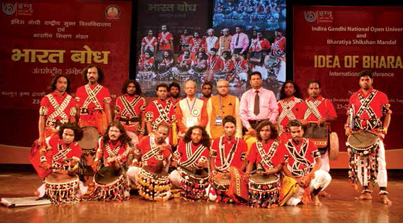 Participants of a cultural performance during Bharat Bodh event at IGNOU
Participants of a cultural performance during Bharat Bodh event at IGNOUWe distribute the material with the help of the postal department. We’ve signed an MoU with the Indian Postal Services. They’ve opened a centre here. Earlier, we used to send it to our regional centres and from there, it would go to the students. But now we do it from here itself. So a lot of time is saved, and we’re able to avoid things getting lost in between. We store the material here. They make thousands of packets daily and dispatch them. The Speed-Post vans take the packets straight to the airport. This way they’re also earning something. If they’re sending 20,000 packets every day, they must be making some money out of it. Similarly, when we conduct exams, we have to send question papers to more than 10,000 and sometimes 20,000 centres and also have to maintain secrecy. So, here again, people from the Postal Department help us in loading these packets straight to the airport for faster delivery. They don't take them to the post-office for putting stamps, etc. Everything is done here itself for quick and better distribution.
‘This is the only place in our country where we’re able to create a Bachelor’s programme in Medical Records Keeping, which is another area that no other university caters to, and where technical manpower is in great demand for better patient care, especially in medico-legal cases which continue for years in our country’
No. It’s not like that. They’re our mini-IGNOUs. Our job here is to produce the academic work; their job is to deliver the things. They distribute the admission forms and admit the students, prepare the lists of the students in various courses, send them here and do the counselling. They also conduct the classes on Saturdays and Sundays. They identify the colleges where practical training and revision classes can be held.
Once the material is distributed, students are advised to attend these weekend classes and do their practicals. We've got thousands of part-time teachers. We call them academic counsellors. They conduct the practical examinations and send the data to us. Then we've got a student evaluation division which conducts the examinations.
We have our centres in all cities and even in small towns. Students therefore need not come to the capital for the examination. For instance, all Bihar students need not go to Patna or Ranchi. We see where the concentration of the students is more and then decide the venue. Like in Delhi, we have 200 centres where we conduct the exams, twice every year—once in June and the other in December.
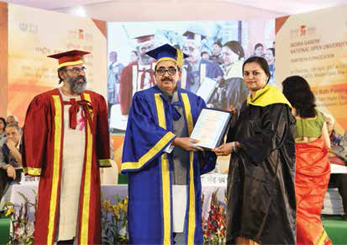 Union Minister of State for Higher Education, Dr Mahendra Nath Pandey(centre), presents the gold medal to a student at the 30th Annual Convocation function held at IGNOU’s headquarters, while the former VC, Prof Ravinder Kumar (left) looks on
Union Minister of State for Higher Education, Dr Mahendra Nath Pandey(centre), presents the gold medal to a student at the 30th Annual Convocation function held at IGNOU’s headquarters, while the former VC, Prof Ravinder Kumar (left) looks onWe have made a mandate to declare results within 42 days. Earlier, it was very erratic, but one of our VCs got a resolution passed that results must come out within 42 days. Ninety per cent of our results are declared within this period. The rest take a little more time because of other reasons, considering the volume of the task.
We’re very liberal in giving chances to our students. If, somebody is doing a certificate course of six months, we give four chances. In case of a degree course of three years, the minimum period is three years, but the maximum is six. So, we give another three years to them to clear it, and that too without charging any additional fees.
Yeah. We charge only for three years, but give liberal opportunities. The beauty of our system is that they can attend the classes all the six years. Say, for example, if there is a married girl who couldn’t attend classes due to delivery or there is a farmer who missed classes because he got ill, he can always come back to attend classes and appear for exams the next time by paying the examination fee of Rs.100/200 per paper only.
Earlier, the evaluation work was also done here but now we've decentralised it by making seven evaluation centres in Bhubaneswar, Bhopal, one each in north-east and south and so on. We've allotted 5-6 states to each such centre and copies from these states go directly over there. So, what was seven times load on us has now got reduced to one-seventh. Our staff at these centres sends copies to our approved teachers who check and send them back to our centres and they, in turn, send us the results.
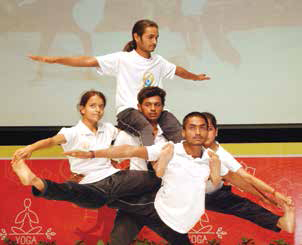 Students perform yoga during the International Yoga Day celebration held at IGNOU
Students perform yoga during the International Yoga Day celebration held at IGNOUWe retain these copies for 3-4 years for these purposes and then dispose them off. We've kept very nominal fees for re-evaluation. Earlier it was `100, now it’s Rs.300 per paper.
Some of our courses are hugely popular in countries like the UAE, UK, Qatar, Kuwait, Oman, Bahrain, Saudi Arabia, Seychelles, Mauritius, Maldives, Ethiopia, Namibia, Kenya, Myanmar, Vietnam, Singapore, Indonesia, Malaysia, China, Nepal, Sri Lanka, Kyrgyzstan, Afghanistan, Fiji, France, Ghana, Gambia, Sierra Leone, Madagascar, Liberia, West Indies, Samoa, Lesotho, Malawi, Switzerland, Nigeria, Mongolia and Zambia, to name only a few. Recently, the minister from Papua New Guinea was here and he wanted that we should establish this kind of university over there. He wanted consultancy for that, so we said, okay, till the time you develop your own university, you can use our material, if you want. So, they wanted the technical know-how. Maybe that will be the next country where we'll be having our programme study centre soon.
Fees from foreigners is certainly higher, but we charge it to serve the poorest of the poor. So, whatever we earn from them, we pass it on to the people who are not able to pay. Recently we've also started the PhD programme in our university.
Same, as per the UGC regulation. UGC has laid down the norms and we follow them.
I can’t give you the exact figures as I've just taken over as VC, but many colleagues say, we’ve produced not one or two, but over 100 IAS officers in our journey so far. We’re compiling the list. To give you just an example, Shashi Prakash Goyal who was earlier Joint Secretary with the Uttar Pradesh Government and is now Principal Secretary to the Uttar Pradesh Chief Minister, Yogi Adityanath, has been a student of our MCA course. Every year, at the time of our convocation, we invite and honour such students for their achievements. I can also tell you that many of our nursing students are also doing very well in their careers. Many of them are serving top corporate hospitals including Delhi’s Max Hospital.
Absolutely, and that's because our all degrees are recognised by the UGC.
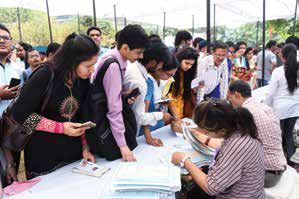 Students collecting their graduation degrees at the IGNOU Convocation
Students collecting their graduation degrees at the IGNOU ConvocationYes. We've a placement cell which regularly conducts on-campus and off-campus placement drives here in Delhi as well as at our regional centres. In 2016, placement drives were conducted for companies like British Telecom (BT), Mahindra & Mahindra, Genpact, Policy Bazar, Convergys, Yatra.com, Goibibo.com, Devlin Formulations, ICICI Prudentials, LIC, Frankfinn and such others. Almost 4422 students took part in these events and 1374 got selected.
Very shortly, we’re going to launch one more scheme for the benefit of school drop-outs with an age bar of 18 years. They may have left studies in class eighth or ninth for whatever reasons. For them, we've developed a BPP or Bachelor Preparatory Programme. They have to do a six-month course and if they clear it, they’ll get direct admission into our BA course.
I belong to a very middle-class family. My father was a clerk in Central Reserve Police Force (CRPF). I was born and brought up in Delhi but my father got transferred to various places. So I've been to Rampur (UP), Ajmer (Rajasthan), Neemuch (MP) and then Mokamaghat (Bihar). The initial years of my study was very disturbed. But after class ninth, my father made sure that my studies were not disturbed because of his transfers. So, four of us, my brother, sister, mother and I stayed here in Delhi so that I could focus on my studies.
I did all my education from government schools. After doing my 11th class or higher secondary from Vijay Nagar School in Delhi, I cleared the Pre Medical Test to get admission in Delhi’s prestigious Maulana Azad Medical College. In 1977, when I passed out, my father told me, ‘I can't support your studies. You have to now earn and support yourself’. So, I started some private practice for some time. But then again after 5-6 years, I came into academics because I always wanted to become a teacher. But before that I did several courses including a diploma in health education.Then I did my MD in Hospital Administration and followed it up with a diploma in Training and Development. Parallely, I did a PG diploma in distance education from IGNOU itself. So, I've been a student of IGNOU also and my association is pretty long. After doing my MD in Community Health Administration, I joined the Voluntary Health Association of India (VHAI ). Then I worked for the National Institute of Health & Family Welfare (NIHFW). Prior to joining IGNOU in 1994, I served NIHFW for four years as Reader and Associate Professor, but that was an ad-hoc job. So when there was a permanent post in IGNOU, I joined its School of Health Sciences.
‘All our course material has also been made available online. This is not just for our students but anyone can see it for free by just taking a password available online. Titled ‘E-Gyankosh’, we’ve put all our course material on government websites for the entire world!’
I got lots of opportunities here to work in many areas for medical, nursing and paramedical personnel through the distance mode. Thanks to a former VC, IGNOU, who started the Centre for Paramedical Sciences, I got to work for its bachelor’s degree program. There are very few such programmes in India. We started six bachelor's programmes in areas like Optometry, Anaesthesia, Radio Therapy and Radiology, to name a few. But that’s not all. I'm also very proud to say that this is the only place in our country where we’re able to create a Bachelor’s programme in Medical Records Keeping which is another area that no other university caters to, and where technical manpower is in great demand for better patient care, especially in medico-legal cases which continue for years in our country. In the last five years, we’ve produced over 600 technically-trained people, many of them coming from very poor jhuggis of Delhi’s Khanpur area, now earning between Rs.40,000 to 50,000 as starting salary, depending upon which corporate hospital they're working for. I feel proud to have produced many quality paramedical personnel who all are doing well, especially in anaesthesia.
Recently, I met a lady working in AIIMS , Delhi who came here for some moderation work. She’s a cardioanaesthesiologist who gives anaesthesia, standing for 12 hours daily, to patients getting operated in AIIMS, and she told me what you’re teaching here and what practical training you’re giving here, even the MD students cannot do there. She said, “The kind of questions, the kind of curriculum you're providing is incredible”. To me, that’s the best certificate of the quality and content of our programme.
We’re very particular about each one of our programmes and work to render quality online degrees in a very, very supportive and flexible environment. You can check out our track record, quality of our study material for different subjects, week-end classes and counselling sessions. The popularity of our programmes on the Gyanvani Educational Channel on FM Radio Station also speaks volumes about the quality of our services. People may say whatever they like about distance education, but we’re very much attached to our students. It’s not that we’re working here just from 9 to 5. You'll find us working and replying to queries of our students even late at night. We're available online all the time for our students.
We’ve centralised our entire admission process and that’s quite a task. We’ve just admitted over 2.5 lakh students and collected the entire fee through the digital centralised online system. Prime Minister Modi keeps exhorting people to go digital, but we’ve actually done it, even in small towns and villages of India! But that’s not all. All our course material has also been made available online. This is not just for our students but anyone can see it for free by just taking a password available online. Titled E-Gyankosh, we’ve put all our course material on government websites for the entire world!
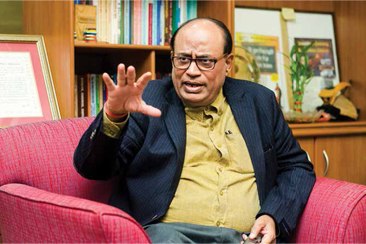
We're not ranked by them because we’re ourselves are the highest ranking body for monitoring and setting standards for all distance learning programmes in the country. Just like NAA C, we’re also distance learning counsellors, being the apex body in distance education. We're a national university, which also helps all those who want to use our courses. There are at least 17-18 state open universities using our material. For example Prof Shrikant Mohapatra, who was here with us, has now become the VC of Odisha State Open University in Sambalpur. We support it with our course material. So many of our colleagues have now become vice chancellors of different universities and they’re all using course material from IGNOU. When I joined here, I was a Reader, but now they’ve elevated me to this chair because the atmosphere here is very conducive for professional growth. There may be some problems here and there but those are there everywhere.
It's an inter-governmental organisation of the Commonwealth of Nations, headquartered in Vancouver, Canada. For the quality of our programmes, COL designated IGNOU as its first Centre of Excellence in Distance Education in 1993 and today we’re partners in strengthening open learning systems throughout the Commonwealth. In fact, the present COL chairperson Asha Kanwar was earlier a professor of English literature at IGNOU.
Nothing is done for free. But it’s true that IGNOU is perhaps the only university offering extensive programmes and training for jail inmates. We started these programmes way back in 1994 with just one centre in Delhi’s Tihar Jail. Today we have over 94 such study centres all over the country and over 25,000 inmates have benefited from this initiative. Jail authorities give us the list of their inmates who wish to study our courses and then we send them the material. We conduct the exams for them in jail just like we do it for other students in June and December. Many of them perform better than students. It’s a noble social cause and we feel proud in associating with it.
Yes. Our school of engineering is offering lots of skill development courses and our paramedical courses also come under this. We're actively thinking of starting some new courses of small durations. We’re trying to grab some big government projects so we can train all the students in skill development.
‘In 2016, placement drives were conducted for companies like British Telecom (BT), Mahindra & Mahindra, Genpact, Policy Bazar, Convergys, Yatra. com, Goibibo.com, Devlin Formulations, ICICI Prudentials, LIC, Frankfinn and such others. Almost 4422 students took part in these events and 1374 got selected’
A recent new initiative we introduced relates to choice-based credit system and we’re also advocating one syllabi for the whole country because we’re providing study material for many state open universities. Incidentally, we're offering a course in disaster management and it’s doing very well. We've got a defence cell also and they offer IGNOU courses for our fauji brothers for which we've signed an MoU with the Defence Ministry. So, our reach has truly crossed all geographical barriers.
I believe in honesty. That's what my father had also taught me. He used to say, honesty is everything. I've been honest in all my professional or personal endeavours. The second thing is, I believe in respect for elders. Hence, I respect all my teachers, elders and my colleagues.
Not as a VC, but as a person I'd like to say, you may earn anything in life including big money, name, fame and whatever else you can think of but there is no substitute to education. It’s your passport to the future because tomorrow belongs only to those who prepare for it today.
By Pradeep Mathur